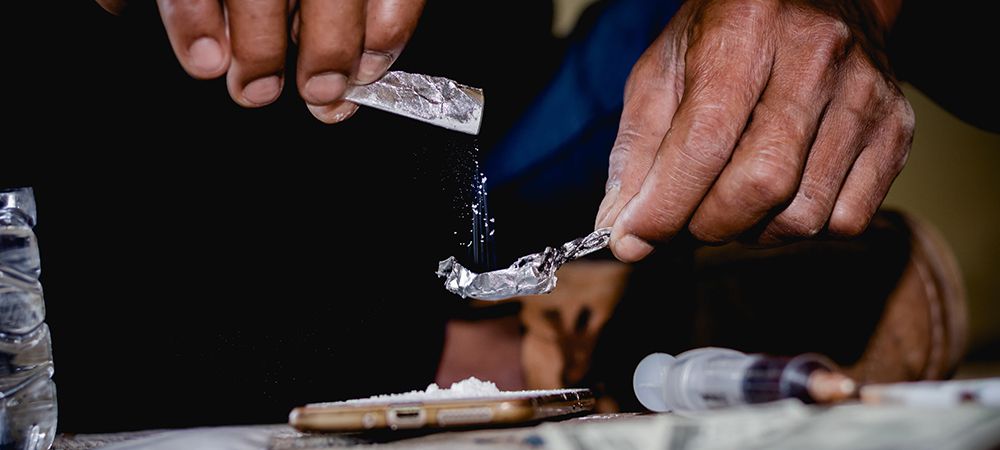How Long Does Cocaine Stay in Your System?
The answer to how long does cocaine stay in your system is anywhere from 3-14 days. Cocaine and its metabolites will show up on a saliva or blood test up to two days after last use. Similarly, your urine will test positive for cocaine up to three days after your last use.
Blood, saliva and urine aren’t the only bodily fluids that can house cocaine substrates. A comprehensive hair test may still reveal cocaine years after your last use.
Furthermore, the timeline for how long cocaine remains in your body depends on many factors. Your weight, dosage and natural metabolism can extend how long cocaine stays in your system. For example, a heavy cocaine user’s urine test results will still return positive up to two weeks after last use.
This blog post is your exhaustive guide to cocaine and how long it remains in the body after last use. Here, we’ll take a look at the critical factors and how they determine when cocaine will leave your body. First, we’ll start with cocaine’s effects on the body.
What Are the Immediate Effects of Cocaine?
Cocaine is a rapid-acting stimulant that targets the user’s central nervous system. It delivers an intense, euphoric high that can last for up to one hour, depending on usage.
Understanding how long cocaine’s effect lasts will give you valuable insight into the subject under discussion. You’ll better understand how long cocaine stays in the system and why.
Note that how long you’ll feel cocaine’s euphoric effects is a function of the usage method. Here’s what we mean.
- Snorting: You’ll feel the effects in less than five minutes after use. These effects may persist for up to 20 minutes after use.
- Intravenous Use: You’ll feel the cocaine high within a few seconds.
- Smoking: You’ll start to feel the effects of cocaine in a few seconds. This intense euphoria can last for 20 minutes.
- Oral ingestion: The effects of cocaine come up to 10-30 minutes after oral use and remain for 90 minutes.
Smoking or injecting cocaine will cause a rush and an intense high. But this high is usually short-lived and will last for only 90 minutes at most. Therefore, it’s not uncommon to see those with a cocaine abuse problem binge-use the substance to sustain a continuous high.
Repeated cocaine abuse like the one described above will increase tolerance and addiction levels. If you’re at this point, it’s important to seek expert help.
For illustration, Inspire Change Wellness Centre has the expertise, serene environment, medical equipment and professional staff to deliver a comprehensive cocaine addiction treatment plan. Find a plan like the one we describe in the previous sentence and go from there.
How Does Your Body Metabolize Cocaine?
Your body metabolizes cocaine by harnessing enzymes present within the blood and liver. This harnessing action leads to the production of metabolites like ecgonine and benzoylecgonine.
The latter, Benzoylecgonine, will show up in a urine test for up to 5 days, depending on your body’s metabolism rate. As such, it’s the main metabolite most lab centres use for cocaine screening exams.
How Cocaine Is Detected on Drug Tests
A 2018 Roadside Survey of British Columbia residents detected stimulants like cocaine in up to 36.1% of drivers. The data team stopped vehicles randomly, collected saliva samples and analyzed them with enzyme immunoassay tech (ELISA).
Cocaine has a half-life spanning only 1 hour. This characteristic means it’ll take your body system roughly one hour to remove half its overall cocaine content. But, regular long-term use can increase the time it takes your body to remove cocaine. This means certain tests can still detect cocaine in your body after a long period.
Below are some standard cocaine tests and their detection timeframes:
- Cocaine metabolites remain identifiable by blood and saliva tests up to 9 days after your last use.
- A hair sample test can discover cocaine for up to 24 months after last use.
- A urine test can detect cocaine anywhere from 3-14 days after last use.
The list above proves there are multiple testing methods available in medical settings. However, urine screening remains the most accessible option in Canada. Therefore, pay close attention to the projected timeline for a urine test if you’re asking how long cocaine will remain in the body due to a work or school issue.
What Happens During Cocaine Toxicology Screening?
Understanding the timeline for when cocaine will leave your body starts with exploring the concept of cocaine toxicology tests. A cocaine screening test attempts to detect the substance in your saliva, urine, hair or blood.
Cocaine toxicology screening will determine whether the substance and its metabolites are in your body. Metabolites are not the same as cocaine. This term refers to the chemicals your body produces while attempting to process cocaine.
The common metabolites present in a cocaine screening test include ecgonine methyl ester and benzoylecgonine. This screening test is usually part of a comprehensive drug test that also searches for marijuana, PCP and amphetamines.
Cocaine toxicology screening typically happens in a designated test centre or your doctor’s office.
Plus, the results are fast too. You can expect to see the results of your cocaine drug test in 5-10 minutes after your test.
The procedure for a cocaine test simply involves peeing in a cup or providing a saliva sample. Either way, the collection of both bodily fluids will happen on-site.
Hair tests are another option for cocaine toxicology screening. This alternative test can detect cocaine metabolites even after a year elapses. However, it’s not a common test in official Canadian circles due to the potential for false positives.
Urine and Blood Tests
How long hard drugs like cocaine remain in the body depends on the substance’s unique half-life. By definition, the half-life is how long it’ll take for the substance concentration in your body to reduce by 50%.
Furthermore, the half-life of any active substance is a function of the existing medium. The half-life of cocaine in blood plasma is usually 1.5 hours. Conversely, its half-life in urine is 4.5 hours.
The half-line of cocaine metabolites is considerably more than the substance itself. For example, benzoylecgonine remains detectable in a urine test for up to 96 hours after use.
Scientific research proves regular cocaine use will foster the substance building up in your body. Therefore, using cocaine consistently over a period will increase how long it stays in your body system. Hence, heavy cocaine users can’t pass drug screening tests, even weeks after the last usage.
Hair Follicle Test
Hair follicle cocaine screening is used in instances that demand long-term testing. Hair follicle tests will discover cocaine after many months of use. This is possible since the test targets blood deposits present in your hair.
We should mention it’s possible to contest the results of a hair follicle test. After all, the environment can also deposit cocaine on your hair. Therefore, you can contest the results using the possibility of false positives as leverage.
Testing Accuracy
Drug tests can also produce false positive results. That’s why expert drug testing centres have come up with the concept of a cutoff limit.
You see, a drug test doesn’t return positive at the slightest discovery of cocaine or its metabolites in your body. Instead, there is a quantity threshold that the test must discover to return a positive result.
This quantity threshold is the cut-off limit. And by definition, it’s the minimum quantity of cocaine substrate needed for positive results. You can have cocaine metabolites present in your body system and still pass a drug screening.
The cut-off limit prevents false positives, which can happen due to environmental contaminants. For example, second-hand smoke can cause a false positive.
The existence of a cutoff limit is important to cocaine drug tests. Let’s take our next-door neighbours as an example. The civil service commission in Massachusetts, USA, says hair testing isn’t enough justification to fire a government worker. The existence of a cutoff limit is important to cocaine drug tests. This directive came after multiple law enforcement officers returned positive on a cocaine hair test.
The decision-makers reasoned that police officers could come in contact with cocaine while handling drug busts, evidence or arrested persons. Therefore, cocaine metabolites in their body system aren’t such a far-fetched possibility.
Best Way to Pass a Cocaine Drug Test
The most effective way to pass a cocaine drug test is to avoid ingesting it in the first place. Conversely, you can abstain from cocaine use for a few weeks before the test.
This strategy will work in the event of a predetermined drug test. But, the possibility of a positive result is high when random testing occurs during ongoing cocaine use.
The possibility of a false positive result is real. Perhaps you’re asking how long does cocaine stay in the body due to a recent test that returned positive.
We recommend a gas chromatography test if you’re confident the initial screening happened when there should be no cocaine in the body. Gas chromatography tests are more expensive, but they’re the closest to complete accuracy. Therefore, it’s the best way to pass a drug test, especially when you need to invalidate what you believe to be false results.
Another tip to help you pass your drug test is using professional drug screening centres. Find centres with advanced screening tech and a reputation for professionalism. It won’t do to fail a drug test because the administrator in charge mishandled your test results.
From our expert perspective, anybody with concerns about failing a cocaine drug test is likely struggling with cocaine abuse. We recommend reviewing the dangers of cocaine abuse and exploring possible treatment options for such an individual. Seek cocaine abuse treatment options quickly!
Factors that Determine How Long Cocaine Stays in Your Body
We’ve established that how long cocaine remains in your body depends on several extenuating factors. The top mentions include:
- Frequency of use
- pH value of your urine
- Urine concentration
- Body mass
- How much cocaine you used
- Last time you used cocaine.
The Drug and Alcohol Testing Industry Association (DATIA), states cocaine detection is possible 2-10 days after last use. This data is a range that varies depending on the following:
Type of Drug Test
Cocaine drug screening works by identifying metabolites present in your body. Furthermore, metabolites have different qualities and remain in your body longer than one another. Therefore, the possibility of detection depends on the type of test and metabolites it targets.
Amount of Cocaine Used
Cocaine detection and usage quantity have a direct relationship. The higher the amount of cocaine in your system, the longer it’ll remain in your body.
Usage Frequency
Cocaine users with a long history of use are likely to have extended detection windows. A blood or saliva test may still return positive results weeks later.
Usage Level
The way you use cocaine also determines the answer to how long does cocaine stay in your system. Smoking or injecting cocaine directly into your bloodstream reduces how long it stays in your system.
Contrastingly, you can expect cocaine to stay in your body for longer if you snort or smear it on your gums.
Purity Level
Cocaine is an illegal substance produced without any regulations. Therefore, the purity level and effect vary across the spectrum. Contaminants in cocaine can play a part in when the substance leaves your body.
Body Composition
Benzoylecgonine is the major metabolite in cocaine. It’s the metabolite most accredited drug screening centres attempt to discover during cocaine tests.
Naturally, the human body stores Benzoylecgonine in fatty deposits and tissue. Consequently, high body fat means cocaine deposits will accumulate quickly within your body.
Alcohol Consumption
Alcohol and cocaine are a toxic combination. Alcohol and cocaine metabolites can combine to increase how long cocaine remains in your body. Unfortunately, most cocaine users tend to combine both substances simultaneously.
Pre-existing Health Conditions
The state of your physical health determines your body’s ability to process any cocaine you ingest. Since your internal system is responsible for cocaine detox, pre-existing conditions make it harder for your body to remove cocaine completely.
Here’s a quick illustration for you. Say the patient has a urinary tract infection. Remember that the urinary tract is a pathway for cocaine detox. Consequently, urinary tract issues can slow the natural detox process, thereby increasing the time cocaine spends in your body.
Does Usage Method Determine How Long Cocaine Stays in Your System?
The usage method determines how fast the substance will reach your brain. As such, the choice of usage method influences how quickly you’ll feel the euphoric effects.
But it only has a minor influence on how long cocaine remains in your body. Whether you ingest or snort, cocaine will still show in your saliva or blood days after the last use.
Will Alcohol Make Cocaine Stay Longer in Your Body?
The time it takes for cocaine to leave your body increases when alcohol is in the mix. The effect of cocaine in combination with alcohol isn’t limited to how long it remains in the body.
Combining cocaine and alcohol can also cause multiple issues, including:
- It can worsen learning deficits.
- Cocaine and alcohol can impair your psychomotor performance
- Combining cocaine and alcohol often causes increased heart rate
- Alcohol increases the rate at which your body retains cocaine by up to 30%. This increased retention happens thanks to cocaethylene, a metabolite that increases cocaine’s cardiotoxic effects.
The scientific data also proves alcohol increases the timeline of when cocaine leaves the body. This conclusion is thanks to a recent study that used dogs as test subjects. And according to conclusions from the test, cocaethylene and cocaine leave the body 20% slower than normal when alcohol is in the mix.
How to Remove Cocaine from Your Body System Quickly
Research on how long it takes cocaine to leave your body is a dark, slippery slope. You’ll likely discover some blogs claiming it’s possible to remove cocaine faster using certain remedies or products. None of these products are scientifically proven to remove cocaine from the body.
Water helps a bit, but it’s not a guaranteed trick to pass a drug test. Drinking too much water can cause water intoxication.
Can Other Substances Cause You to Test Positive for Cocaine?
No other substance can make you test positive for cocaine. Still, it’s not uncommon to get a positive test result, even when you haven’t been using cocaine.
That’s why we always recommend following up with the designated test centre if you suspect any foul play with the result. For instance, you can ask the specialist in charge to confirm the results with higher precision methods like gas chromatography or mass spectrometry.
Drug Testing Realities in the Average Canadian Workplace
It’s illegal to drive a car under the influence of cocaine and alcohol. There’s no doubt about it. The introduction of breathalyzers for on-site driver testing has reduced alcohol-related accidents.
The reduction in alcohol-related accidents is an impact many Canadian companies are looking to mirror by incorporating drug tests. These drug testing programs are in place to identify workers who use cocaine and marijuana.
How Common is Drug Testing in Canadian Workplaces?
A recent survey shows that drug testing is the norm in up to 10% of Canadian workplaces with at least 100 workers. The numbers for our next-door neighbours, USA, are significantly higher. Organizations in the United States have legislative backing to conduct drug tests more frequently.
The reverse is the case here in Canada. Drug testing only happens in situations where there might be a safety risk.
Why Do Canadian Companies Conduct Drug Tests?
The major reason Canadian companies conduct drug tests is to reduce accidents related to drug use. Most employers argue that cocaine abuse, whether on-site or off-site, increases the probability of mishaps at work. As such, many companies use saliva and drug tests to identify cannabis, opioid, cocaine and cannabis abuse.
Employers in Canada utilize drug tests in different varied scenarios. For instance, job applicants may have to comply with a drug test during the interview. Likewise, employees who suffer an accident on the job may have to comply with mandatory drug tests.
Is Drug Testing Effective?
Drug testing in the workplace does have its limitations. The biggest one is the inability to tell whether the employee is abusing a substance at the time of the drug screening.
For example, breathalyzer tests detect alcohol abuse depending on whether the subject is drunk at the time of the examination. Conversely, cocaine tests can only determine whether or not the participant has used drugs recently.
The average saliva test will detect cocaine metabolites that have been in the body for up to 4 weeks. This extended result timeline begs an important question. Does someone using cocaine four weeks ago make them a current workplace threat?
It’s questions of this nature that dilute the effectiveness of drug testing at the workplace. Sure, it’s logical to assume that employees who use drugs will have higher accident rates at work. But no scientific study has successfully linked the higher accident rate to drug abuse.
Related Article: What Are The Long-Term Effects Of Cocaine Addiction?
Long-Term Effects of Cocaine Abuse
Most people who ask how long does cocaine remain in the system are struggling with a cocaine addiction problem. This addiction can be quite debilitating, leading to severe long-term effects for most users.
Some of the long-term effects of cocaine abuse include the following:
- Increased risk of seizures and stroke
- Aortic ruptures
- Inflammation of the heart muscles
- Reduces the heart’s ability to contract
- Contributes to the development of Parkinson’s disease
- Reduced ability to concentrate, make decisions, remember details and conduct motor tasks
- Malnourishment
- Problems swallowing
- Runny nose
- Intense asthma symptoms
- Serious weight loss
- Reduced ability to smell
How to Cope with Cocaine Withdrawal
How long does cocaine stay in your system is a question that often precedes withdrawal. When cocaine finally leaves your body, its first response is to crave the substance. Withdrawal symptoms are your body’s response to the lack of cocaine. And they can be severe depending on the frequency of cocaine abuse.
Another way to explain withdrawal is the loans system. It’s almost like you take a “good feelings” loan from your body when you’re high. The withdrawal stage is the phase where you repay the debt. Hence, you’re likely to feel worse during the crash.
Cocaine addiction specialists refer to this crash as the rebound effect. It’s your body’s natural response in a bit to maintain homeostasis.
Although the effects of withdrawal can be intense, they’re not permanent. These withdrawal symptoms may last for only a few hours in some cases. The initial crash when cocaine leaves your body varies and can last for a few days.
It’s also possible for cocaine addicts to experience withdrawal symptoms for a few months. This situation is known as Post-acute Withdrawal Syndrome (PAWS).
The previous paragraphs prove everybody has a different experience with cocaine withdrawal. But, the following are symptoms common to the average withdrawal experience:
Cocaine Cravings
You’ll know when cocaine has left your body, thanks to the intense cravings afterward. These cravings describe an intense desire to use more cocaine.
Cravings are your body’s attempt to soothe the other withdrawal symptoms and re-experience the pleasure of a cocaine high.
Fatigue
Tiredness and extreme lethargy are typical of the average cocaine withdrawal experience. This exhaustion is the body’s natural reaction to cocaine’s stimulating effects. Plus, people high on cocaine tend to stay awake while engaging in energetic activities.
Cocaine will mask any discomfort you’re supposed to feel while overactive, worsening the feelings of tiredness and lethargy.
Mood Changes
Anxiety, depression and irritability are symptoms of cocaine withdrawal. These feelings are often super intense and will lead to sharp changes in your mood and demeanour.
Sleeping Problems
Difficulties sleeping is one of the major symptoms cocaine has left your body. Despite the lethargy and tiredness that comes with cocaine withdrawal, patients are often unable to sleep afterwards. They often have sleeping problems like vivid dreams, hypersomnia, and insomnia.
Increased Appetite
Food cravings are an unavoidable symptom of cocaine addiction withdrawal. Usually, this symptom gets worse because most cocaine addicts don’t eat properly while they’re on the substance.
Despite the increased appetite, it’s important not to binge during cocaine recovery. Instead, you should focus on supporting your recovery through a healthy, small diet.
Physical Agitation
Cocaine addiction withdrawal often comes with a loss of motor skills. Patients may experience a slowing down effect, also known as psychomotor retardation. Conversely, patients may also feel some measure of physical agitation during the withdrawal stage.
Other common cocaine addiction withdrawal symptoms include:
- Irritation
- Depression symptoms
- Anxiety symptoms
- Restlessness
- Vivid dreams
- Lack of energy
- Restlessness
The withdrawal symptoms above show up within a few days of your last cocaine use, depending on when the substance leaves your body.
How to Manage Cocaine Addiction Withdrawal
Now that you know how long cocaine stays in your system, you can start preparing for when that time comes.
Eating Regularly
A healthy diet is key to helping your body recover when cocaine leaves the system. So, even when you don’t have an appetite, your body still needs all the essential nutrients. We recommend eating nutrient-rich foods like fruits, veggies, and whole grains.
Hydration
Plenty of fluids will increase your body’s ability to detox and remove toxins in its system. And, the good news is water isn’t the only way to get the hydration you need. Juices, soups, and energy drinks also count.
Rest and Get Some Air
Taking it is a big part of adjusting to cocaine’s absence in your body. Give yourself time to recuperate and recover those energy bars you lost while high on cocaine.
We also recommend getting plenty of air. Fresh air can clear your head, revitalizing you and boosting your spirits. We recommend going for a walk, even if it’s just down the street. Find a slightly sunny location to sit and breathe in a lungful of clean air.
Stay Entertained
Cocaine addiction withdrawal will come with feelings of restlessness. You can occupy this timeline by engaging in different mindless activities. For example, you can watch reruns of your top television shows, read a book or work out.
Cocaine withdrawal doesn’t necessarily require medical attention, especially if your symptoms are mild. But, DIY at-home treatment should never take the place of a comprehensive addiction recovery plan.
Recognizing a Cocaine Overdose
Most people ask questions about when cocaine will leave the body because they’re worried about an overdose. If this is you, it’s important to learn to recognize an impending cocaine overdose.
Some of the common signs of cocaine overdose include:
- Increased blood pressure
- Irregular heartbeat
- Hallucinations
- Agitation
- Seizures
- Trouble breathing
- Noisy breath
- Pinned pupils
- Unconsciousness
- Pale skin
- Chest pain
Cocaine overdoses aren’t a common occurrence. However, contaminants like fentanyl in cocaine can increase the possibility of an overdose. We often recommend that cocaine addicts have people around them who can call emergency numbers if a situation occurs.
You may also want to have Naloxone at hand while abusing cocaine. Naloxone is a medication that reverses a possible overdose due to contaminated cocaine.
Related Article: Addiction Treatment: The 5 Stages of Addiction
The Bottom Line
The human body metabolizes cocaine faster than other hard substances. But it’s hard to put a precise number on how long cocaine stays in your system. The situation is complicated due to the many factors determining the timeline of cocaine’s presence in the body.
Factors like usage level, body composition, and pre-existing health conditions can extend how long cocaine remains in your body. Depending on these factors, cocaine can remain in your body for up to two weeks following the last usage.
Here at Inspire Change Wellness Centre, we handle cocaine addiction treatment with comprehensive programs. Our specialists will design a program that makes it easier for your body to detox and start recovery. Call us today to earn a free consultation session.






